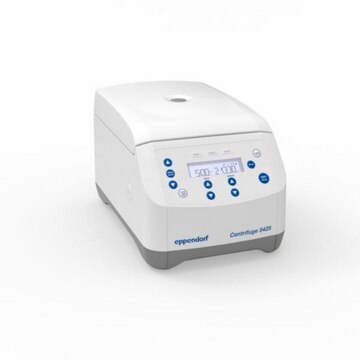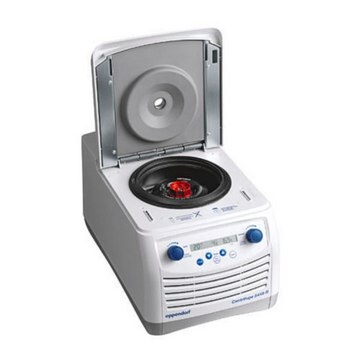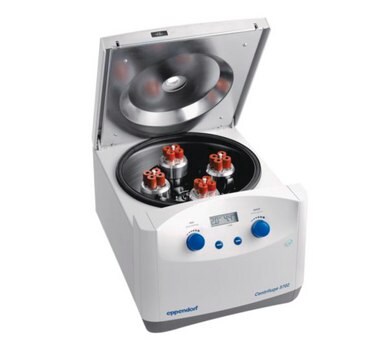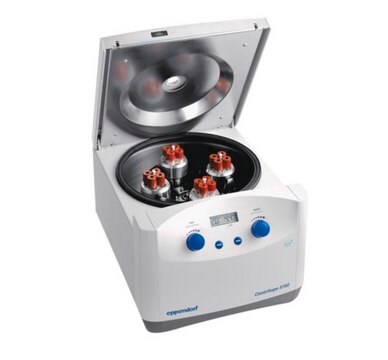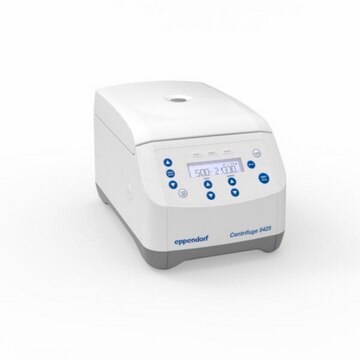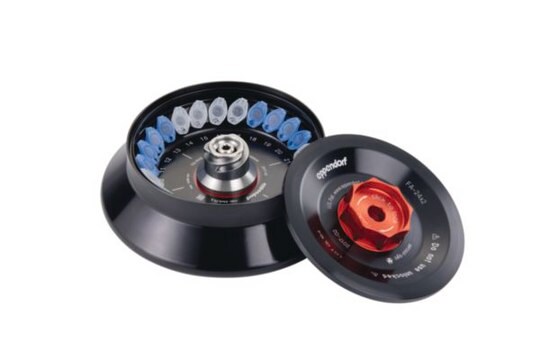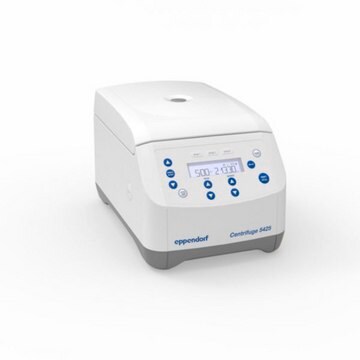EP5405000565
Eppendorf® Centrifuge 5425 G
Knob, FA-24x2, AC/DC input 230 V AC, UK plug
Synonim(y):
Pokrywa do rotora 632 FA-45-48-11
About This Item
Polecane produkty
wejście AC/DC
, universal plug set
230 V
Właściwości
CE compliant
to hold 24 1.5/2.0 mL tubes
Knob, FA-24x2
producent / nazwa handlowa
5405000565
Eppendorf® 5405000565
Eppendorf®
Parametry
15060 rpm
21300 × g
metody
centrifugation: suitable
Szukasz podobnych produktów? Odwiedź Przewodnik dotyczący porównywania produktów
Opis ogólny
Cechy i korzyści
- Zaprojektowany z myślą o standardowych zastosowaniach. Działa jako niezawodny partner, zwłaszcza dla użytkowników o wysokiej wydajności, oczekujących najwyższego poziomu komfortu ergonomicznego i zapewnia dużą elastyczność dzięki 6 opcjom wirników
- Cicha mikrowirówka zapewniająca bezstresową pracę.
- Aerozoloszczelne pokrywy Eppendorf QuickLock zapewniają prostą i bezpieczną obsługę.
- Znakomite funkcje oprogramowania (np. 10 ramp przyspieszania i hamowania, 3 przyciski programów, krótka funkcja bez ciągłego naciskania przycisku).
- Rozszerzony program rotora (np. rotor 5,0 ml, rotor z wiadrem wahadłowym do pasków PCR).
- Konstrukcja OptiBowl zapewnia cichą pracę, nawet bez pokrywy rotora.
- Miękkie zamknięcie pokrywy jednym palcem zapewnia ergonomiczną obsługę.
- Automatyczne otwieranie pokrywy po zakończeniu pracy - zapobiega nagrzewaniu się próbek i umożliwia łatwy dostęp do nich.
- Maks. pojemność rotora: 10 × 5,0 ml naczyń
- Maks. prędkość: 21 300 × g (15 060 obr./min)
- Szybsze przyspieszanie i zwalnianie (10 ramp przyspieszania i hamowania).
- Niewielka powierzchnia zajmująca tylko tyle miejsca w laboratorium, ile potrzeba.
- Niższa wysokość załadunku umożliwiająca wygodne wkładanie rotora i/lub próbek.
- Komora rotora wykonana ze stali nierdzewnej.
Informacje prawne
Wybierz jedną z najnowszych wersji:
Certyfikaty analizy (CoA)
It looks like we've run into a problem, but you can still download Certificates of Analysis from our Dokumenty section.
Proszę o kontakt, jeśli potrzebna jest pomoc Obsługa Klienta
Masz już ten produkt?
Dokumenty związane z niedawno zakupionymi produktami zostały zamieszczone w Bibliotece dokumentów.
Global Trade Item Number
| SKU | GTIN |
|---|---|
| EP5405000565-1EA | 4022536219455 |
Nasz zespół naukowców ma doświadczenie we wszystkich obszarach badań, w tym w naukach przyrodniczych, materiałoznawstwie, syntezie chemicznej, chromatografii, analityce i wielu innych dziedzinach.
Skontaktuj się z zespołem ds. pomocy technicznej